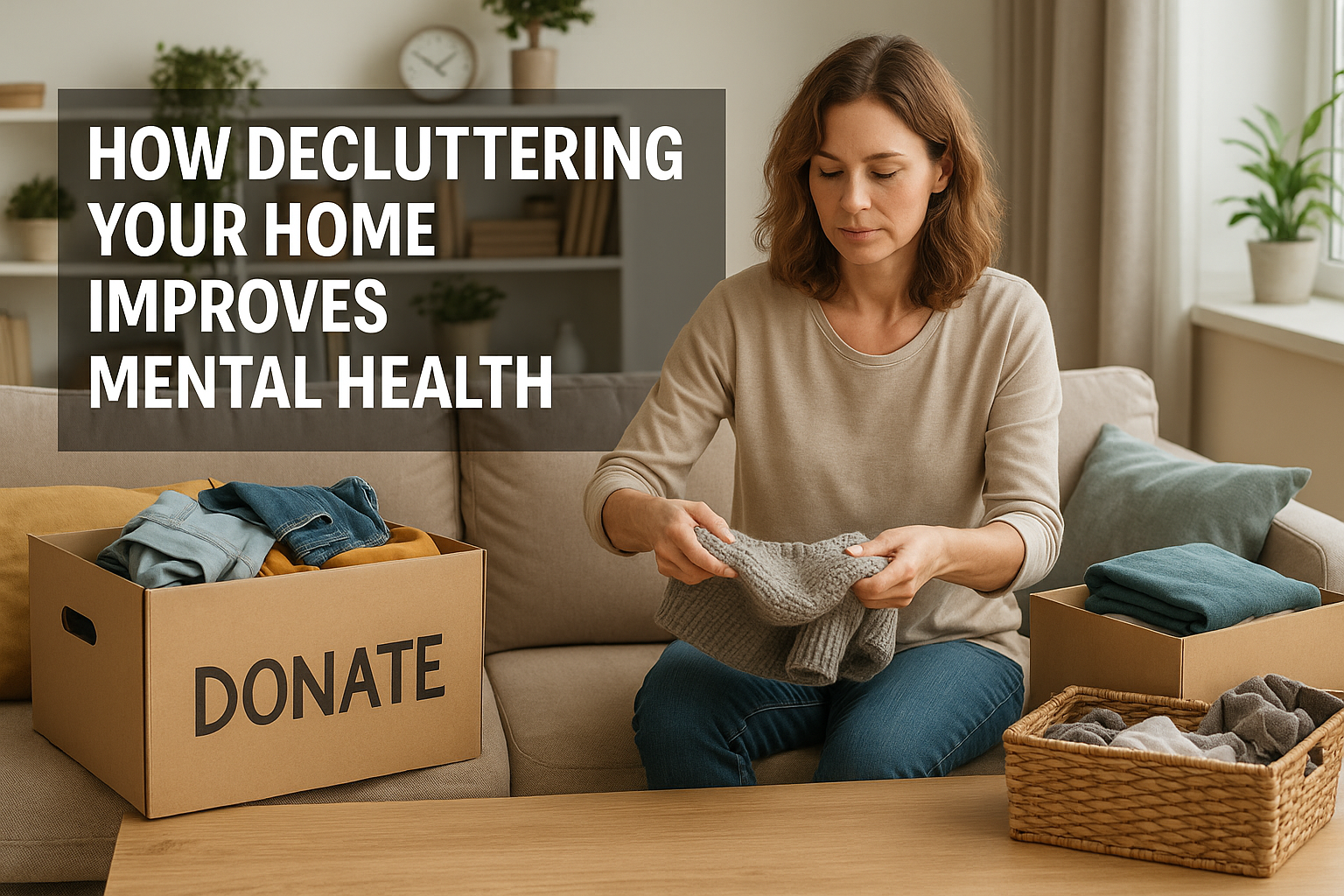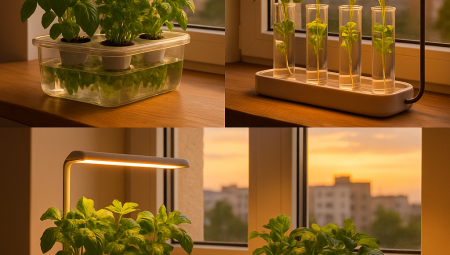The Link Between Physical Clutter and Mental Overload
Have you ever walked into a messy room and instantly felt stressed or overwhelmed? That’s no coincidence. Physical clutter competes for your attention and creates visual and cognitive noise. Over time, it leads to:
-
Cognitive fatigue: Your brain spends extra effort filtering stimuli.
-
Visual stress: Piles of items or disorder send danger-like signals to your brain.
-
Emotional drain: Clutter triggers guilt (“I should clean this”), shame, or helplessness.
This “stuff stress” builds up silently, impacting daily function and emotional wellness.
Science Behind the Clutter-Mind Connection
Research across disciplines supports how our surroundings impact our inner world:
-
A UCLA study found mothers living in cluttered homes had elevated cortisol (stress hormone) levels throughout the day.
-
Princeton Neuroscience Institute showed that clutter reduces working memory and focus.
-
Behavioral psychologists link messy environments with increased procrastination, anxiety, and impulsive decisions.
In short, a cluttered space creates a cluttered mind—scientifically.
21 Mental Health Benefits of a Tidy, Organized Home
-
Reduces Anxiety: Clean spaces promote calm and emotional stability.
-
Boosts Mood: A sense of order lifts spirits and improves optimism.
-
Enhances Focus: Fewer distractions mean better concentration.
-
Improves Sleep Quality: A tidy bedroom encourages relaxation and melatonin production.
-
Builds Motivation: Progress in your environment sparks action in other areas.
-
Promotes Mindfulness: Sorting and tidying anchor you in the present moment.
-
Eases Depression: Achieving control over space creates hope and momentum.
-
Encourages Physical Movement: Cleaning involves movement, releasing feel-good endorphins.
-
Supports Goal Setting: Clarity of space reflects clarity of purpose.
-
Increases Self-Control: Organized homes foster better decision-making.
-
Sparks Joy: Only keeping items that serve or inspire you improves satisfaction.
-
Calms the Nervous System: Orderly surroundings reduce overstimulation.
-
Improves Time Management: You waste less time looking for items.
-
Reduces Decision Fatigue: Fewer options = less stress in daily choices.
-
Fosters a Sense of Accomplishment: Tangible results fuel pride.
-
Declutters the Mind: Clean visuals encourage mental clarity.
-
Enhances Productivity: Tidy desks increase work efficiency.
-
Supports Better Relationships: Less mess = fewer household conflicts.
-
Encourages Gratitude: Being intentional with possessions cultivates appreciation.
-
Stimulates Creativity: Spaciousness leaves room for new ideas.
-
Gives a Sense of Control: In a chaotic world, your home becomes a sanctuary.
Common Clutter Hotspots and Their Psychological Toll
Every home has certain spaces that become clutter magnets. And these spots often carry the heaviest emotional weight:
-
Closets: Overflowing closets often symbolize indecision, anxiety about identity, or resistance to letting go of the past. They can trigger shame or frustration every time they’re opened.
-
Kitchens: Cluttered countertops and pantries lead to unhealthy food choices and stress. Cooking becomes chaotic, reducing mindfulness and enjoyment in daily routines.
-
Workspaces/Home Offices: A disorganized desk limits creativity and invites procrastination. It reduces productivity, especially in remote or hybrid work setups.
-
Entryways: Piles of shoes, bags, and coats cause mental friction right as you walk in—an uninviting first impression of your own home.
When we regularly see clutter in these places, it subtly communicates: “You’re behind. You’re not in control.” Reclaiming these spaces is more than tidying—it’s reclaiming your mental and emotional authority.
How to Start Decluttering Without Overwhelm
For many, the idea of decluttering can feel more stressful than helpful. But the key lies in approaching it as a mental wellness activity, not a home project. Try these approaches:
-
The 5-Minute Rule: Pick one drawer, one shelf, or one task. Commit to five minutes—progress beats perfection.
-
Room-by-Room Strategy: Don’t try to fix everything at once. Start with the space that affects your mental clarity the most—often the bedroom or workspace.
-
Use “Keep, Donate, Toss” Bins: This simplifies decision-making and avoids backtracking.
-
Embrace Emotional Attachment, Then Act: If an item stirs guilt or nostalgia, acknowledge it—but ask: “Does it still serve the person I am today?”
-
Celebrate Small Wins: After every finished space, pause, breathe, and acknowledge how your mood shifts.
Decluttering isn’t about being minimalist or perfect. It’s about creating a space that supports—not sabotages—your peace of mind.
Minimalism vs Decluttering: Are They the Same?
Though often used interchangeably, decluttering and minimalism are not identical:
Aspect Decluttering Minimalism Purpose To reduce chaos and gain clarity To live with intentional simplicity Scope Temporary or ongoing effort Long-term lifestyle shift Flexibility Adaptable to any lifestyle Often requires significant change in values Outcome A cleaner, calmer space A philosophical alignment with “less is more” You can declutter without being a minimalist—but often, the mental clarity gained leads people to voluntarily embrace minimalism in certain aspects of life.
Why Clutter May Reflect Inner Chaos
Sometimes, clutter isn’t just a habit—it’s a symptom.
-
Depression: Fatigue and hopelessness reduce motivation to tidy up.
-
Anxiety: Fear of needing something later can make it hard to throw anything away.
-
ADHD or Executive Dysfunction: Difficulty with organization and task completion leaves environments in flux.
-
Grief and Trauma: Keeping certain items becomes a way to preserve identity or loved ones.
-
Hoarding Disorder: A clinical condition where discarding feels psychologically distressing.
Understanding the emotional and psychological roots of clutter helps you approach it with compassion, not judgment. Therapy, support groups, or accountability partners can help untangle these patterns.
FAQs About Decluttering and Mental Well-Being
Q1: Can decluttering actually reduce anxiety?
Yes. Numerous studies show that a clean, organized environment lowers cortisol and improves calm.Q2: Do I have to get rid of everything to benefit?
Not at all. Even small changes—like clearing a nightstand—can significantly improve mental clarity.Q3: What if my partner or family resists decluttering?
Start with your personal space. Let the results speak for themselves. Often, the shift in energy encourages others.Q4: Does decluttering help with focus?
Absolutely. A visually clean space reduces mental distractions, making it easier to concentrate.Q5: Is professional help worth it?
If you feel stuck, a decluttering coach or therapist can guide you gently, especially if emotional attachment is strong.
Conclusion: Clear Space, Clear Mind
Your home isn’t just where you live—it’s where your mind rests. Decluttering isn’t about perfection or aesthetics. It’s about creating a supportive, peaceful environment that mirrors your values and mental goals.
When you clear out what no longer serves you, you make room for what energizes, grounds, and inspires you.
Start with one corner, one drawer. Your mental health will thank you.
🔗 External Resource: Psychology Today – How Clutter Affects Your Brain
-



